Signs of Dyslexia
People with dyslexia have problem recognizing sounds (phonemes) in words and mixing them with each other to read. These individuals are commonly rather bright and might have strong capacities in areas apart from reading.
Everyone experiences dyslexia differently, but a cluster of the following signs and symptoms can recommend a medical diagnosis of dyslexia:
Slow Analysis
Individuals with dyslexia have problem identifying the audios of letters and mixing those audios with each other to review words. They have trouble with the tiniest systems of noise in a word, called phonemes (noticable FO-neems), such as the b in "bat" and the d in "bed." These issues make it difficult to read quickly and accurately.
They frequently have trouble reading in a quiet environment and might be conveniently sidetracked by sound. They may puzzle left and best, or have a challenging time telling if something is upside down. They might use a great deal of getting rid of and cross-outs when duplicating from the board or a publication.
If your kid is not carrying out well in school and shows several of these signs and symptoms, talk with their instructor. They may suggest testing, either via your family practitioner or below at NeuroHealth, to verify a diagnosis of dyslexia. The sooner the problem is recognized, the a lot more efficient treatment will be.
Trouble in Punctuation
In most cases, people with dyslexia also have trouble leading to and composing. They frequently misspell words even one-syllable words and have a tough time bearing in mind exactly how to form cursive letters (f and d, m and n, and so on). They might likewise battle with capitalization and punctuation. Occasionally their composed work is nearly unintelligible, as in the case of dysgraphia.
They may have trouble with grammar also, such as reversing grammatic products like 'aminal' for animal and blending comparable seeming words, or making errors in recognizing the order of numbers or letter patterns (auction/caution, soiled/solid). They may also neglect the lyrics to songs or have problem poetry.
These issues may be seen in youngsters of any kind of age, however are most noticeable in school-aged youngsters. If you have more info any type of concerns, talk with your kid's family doctor or request for testing from a specialist such as the NeuroHealth group. The earlier dyslexia is diagnosed and dealt with, the much better.
Difficulty in Remembering
People with dyslexia have trouble acknowledging phonemes (pronounced FO-neems), the fundamental sounds of speech. This makes it hard to discover punctuation and vocabulary, and to check out because it takes a long period of time to sound out words.
This is why children with dyslexia usually battle in school. They can handle early analysis and spelling jobs with help from superb direction, but the troubles become extra incapacitating with tougher subjects, such as grammar and understanding book material.
Several kids with undiagnosed dyslexia come to be aggravated at not staying up to date with their peers. They might start to think that they are stupid or otherwise as smart as various other students.
Ultimately, these sensations can result in inadequate self-confidence and clinical depression. They can also make it tough for people with dyslexia to maintain work, because it's tough to keep up at the workplace if you can't mean or review.
Problem in Creating
Many people with dyslexia have problem writing legibly and in the right order. They might also have difficulty with grammar. For example, they may blend capital letters or utilize homonyms (such as their and there) incorrectly.
Typically, these troubles do not show up till youngsters reach primary school and must discover to check out. This is when the gap between their analysis ability and that of their peers expands.
An individual with dyslexia is not necessarily much less smart than their peers, but their lack of ability to decode new words and blend audios to make them understandable produces an unanticipated gap between their capacities and scholastic achievement. Observing a collection of these signs and symptoms is a good indicator that a youngster is struggling with dyslexia and needs expert analysis by qualified academic psycho therapists or neuropsychologists. By very early diagnosis and intervention, kids can be aided to develop strong reading and language abilities. They can after that progress through institution with self-confidence.
 Jonathan Taylor Thomas Then & Now!
Jonathan Taylor Thomas Then & Now! Kelly McGillis Then & Now!
Kelly McGillis Then & Now! Michael Oliver Then & Now!
Michael Oliver Then & Now! Atticus Shaffer Then & Now!
Atticus Shaffer Then & Now! Andrew McCarthy Then & Now!
Andrew McCarthy Then & Now!